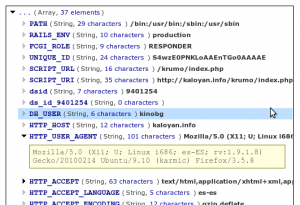Cuando se quieren evitar ataques XSS, normalmente en PHP se usan las funciones htmlspecialchars o htmlentities.
Ahora veo un ejemplo en el que un ataque puede evitar estas funciones cuando se crea la página con HTML no estándar. Tenemos el tÃpico ejemplo de un texto que se introduce por un formulario y se presenta como un enlace.
$dato = htmlentities($_GET['dato'], ENT_QUOTES);
echo "<a href=pagina.php?dato=$dato>Enlace</a>";
Si os fijáis bien veréis que el enlace está mal formado y no tiene las comillas en el href. Si metieramos como dato de entrada lo siguiente: ” onclick=alert(null)” (sin las comillas), nuestra página sufrirÃa un ataque XSS y mostrarÃa un mensaje alert.
Non-Standard HTML Fuels XSS Attacks

 Ha salido la nueva versión de PHP, la 5.2.5, estando centrada esta versión en mejorar la estabilidad con cerca de 60 errores solucionados, algunos de ellos relativos a la seguridad, por lo que es necesario actualizar nuestras versiones de PHP.
Ha salido la nueva versión de PHP, la 5.2.5, estando centrada esta versión en mejorar la estabilidad con cerca de 60 errores solucionados, algunos de ellos relativos a la seguridad, por lo que es necesario actualizar nuestras versiones de PHP.
Yo uso otro funcion como reemplazo de var_dump (extraida de CakePHP) que aunque no tiene colores presenta la informacion bastante ordenada:
[code]
function debug($var = false, $showFrom = true) {
if ($showFrom) {
$calledFrom = debug_backtrace();
$file = str_replace(‘\\’, ‘/’, $calledFrom[0][‘file’]);
echo ‘‘ . $file . ‘‘;
echo ‘ (line ‘ . $calledFrom[0][‘line’] . ‘)’;
}
echo “\n\n”;
$var = print_r($var, true);
echo $var . “\n\n”;
}
[/code]
Bueno la clase esta interesante y muy practica, gracias por publicar un post con la info.
Saludos.
Gracias Gabriel por el script.
Domingo, espero que te sea de utilidad
Yo suelo utilizar la función fb de FirePHP, un complemento de Firebug:
http://www.firephp.org/